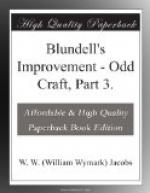“He nearly lost ’is life over you,” said the stout fisherman. “As plucky a thing as ever I see. If I ‘adn’t ha’ been ’andy with that there line you’d both ha’ been drownded.”
“Give—my love—to everybody,” said Blundell, faintly. “Good-bye, Venia. Good-bye, Mr. Turnbull.”
“Where’s that barrel?” demanded the stout fisher-man, crisply. “Going to be all night with it? Now, two of you——”
Mr. Blundell, with a great effort, and assisted by Venia and the sergeant, sat up. He felt that he had made a good impression, and had no desire to spoil it by riding the barrel. With one exception, everybody was regarding him with moist-eyed admiration. The exception’s eyes were, perhaps, the moistest of them all, but admiration had no place in them.
“You’re all being made fools of,” he said, getting up and stamping. “I tell you he pushed me over-board for the purpose.”
“Oh, father! how can you?” demanded Venia, angrily. “He saved your life.”
“He pushed me in,” repeated the farmer. “Told me to look at a jelly-fish and pushed me in.”
“What for?” inquired Sergeant Daly.
“Because—” said Mr. Turnbull. He looked at the unconscious sergeant, and the words on his lips died away in an inarticulate growl.
“What for?” pursued the sergeant, in triumph. “Be reasonable, Mr. Turnbull. Where’s the reason in pushing you overboard and then nearly losing his life saving you? That would be a fool’s trick. It was as fine a thing as ever I saw.”
“What you ’ad, Mr. Turnbull,” said the stout fisherman, tapping him on the arm, “was a little touch o’ the sun.”
“What felt to you like a push,” said another man, “and over you went.”
“As easy as easy,” said a third.
“You’re red in the face now,” said the stout fisherman, regarding him critically, “and your eyes are starting. You take my advice and get ’ome and get to bed, and the first thing you’ll do when you get your senses back will be to go round and thank Mr. Blundell for all ’e’s done for you.”
[Illustration: “You take my advice and get ’ome and get to bed.”]
Mr. Turnbull looked at them, and the circle of intelligent faces grew misty before his angry eyes. One man, ignoring his sodden condition, recommended a wet handkerchief tied round his brow.
“I don’t want any thanks, Mr. Turnbull,” said Blundell, feebly, as he was assisted to his feet. “I’d do as much for you again.”
The stout fisherman patted him admiringly on the back, and Mr. Turnbull felt like a prophet beholding a realised vision as the spectators clustered round Mr. Blundell and followed their friends’ example. Tenderly but firmly they led the hero in triumph up the quay toward home, shouting out eulogistic descriptions of his valour to curious neighbours as they passed. Mr. Turnbull, churlishly keeping his distance in the rear of the procession, received in grim silence the congratulations of his friends.




